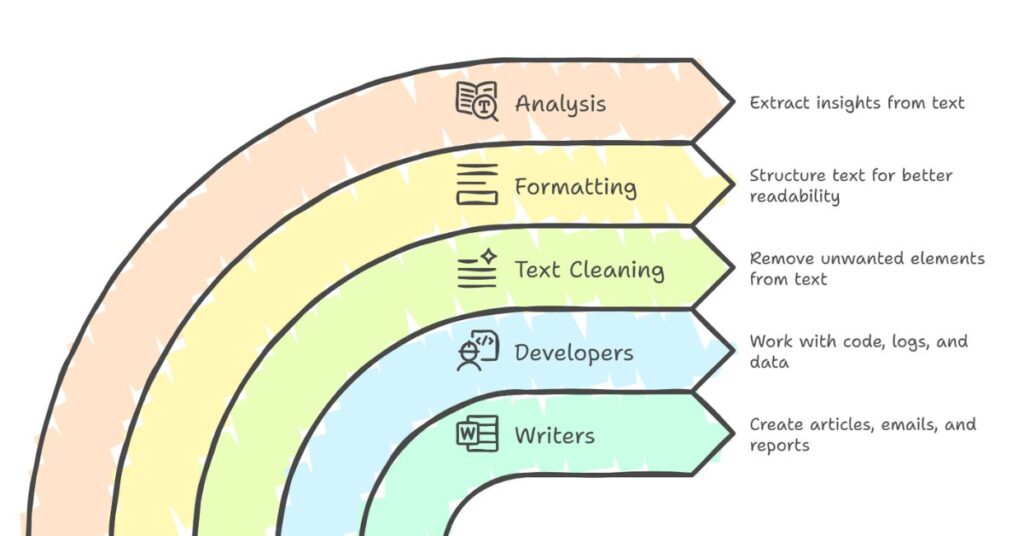Top Online Text Tools for Writers & Developers
Table of Contents
As a CSE engineer with experience in software development, I often work with raw text. Whether it’s editing content, formatting JSON, converting case, or removing duplicates, I rely on quick online tools. These tools save time, improve productivity, and reduce manual errors. Writers and developers use them daily for fast results.
This article lists the best online text tools. It covers their features, use cases, and why they matter for daily tasks. I wrote this based on tools I use while working in the IT sector.
Why Writers and Developers Use Online Text Tools
Writers create articles, emails, and reports. Developers work with code, logs, and data. Both groups deal with text. They need tools to clean, format, and analyze it.

Online tools remove the need to install software. Users just paste text into a browser. Tools return clean, converted, or formatted output instantly.
These tools help with the following:
- Changing case (e.g., uppercase to lowercase)
- Removing duplicate lines
- Formatting JSON or XML
- Counting characters and words
- Escaping special characters
Case Conversion Tools
One of the most used tools is the case converter. Writers fix capitalization. Developers convert text for JSON or API formats.
Common case types:
- Uppercase (ALL CAPS)
- Lowercase (all small)
- Title Case (Each Word Capitalized)
- Sentence case (First word only capitalized)
- CamelCase (for coding variables)
You paste the text. You select a case. The tool returns updated text. No need for scripts or regex.
Supporting keywords: text case converter, change text case, online capitalization tool
Character and Word Counter
Writers must follow word limits. Developers check input sizes. A simple character and word counter helps both.
Paste your content. The tool shows total characters, words, and lines. Some also show paragraph count.
These tools help with:
- SEO-friendly content creation
- Social media post limits
- String length checks in code
I use this tool when writing meta descriptions or preparing text for database fields.
Supporting keywords: online word counter, character count tool, text length checker
Text Formatter and Beautifier
Code and data often need better formatting. JSON, XML, and SQL are hard to read in raw form.
Text formatter tools beautify:
- JSON objects
- XML markup
- SQL queries
You paste the input. The tool applies indentation. The result is readable and clean.
I use this when checking API responses or debugging backend output. Writers use it for structured data or HTML.
Supporting keywords: JSON formatter, XML beautifier, online SQL formatter
Remove Duplicate Lines and Sort Text
Large lists often contain repeated lines. Writers and coders need clean lists. Tools that remove duplicates or sort lines alphabetically solve this.
These tools:
- Remove repeated text
- Sort lines in ascending or descending order
- Trim extra spaces
You copy a list. Paste it into the tool. Choose “remove duplicates” or “sort text.” The tool updates the content.
I use it for log analysis, config files, or data exports.
Supporting keywords: remove duplicate lines, sort text online, line cleaner
Find and Replace Text Online
Simple find and replace tools help modify repetitive content. Writers use it to update phrases. Developers update values or keys in data.
Steps:
- Paste the text
- Enter text to find
- Enter replacement text
- Click “Replace”
The tool updates all matches at once.
This tool supports global edits without opening a text editor. It’s useful for quick changes in small files.
Supporting keywords: online find replace, replace text tool, bulk text update
URL Encoder and Decoder
Web content often needs URL-safe encoding. Developers use URL encoders when working with APIs, links, and form data.
Paste a string. The encoder converts special characters into safe formats (like %20 for spaces). Decoders reverse the process.
I use it for encoding query strings or decoding logs from client requests.
Supporting keywords: URL encoder, decode web links, encode online
Base64 Encoder and Decoder
Base64 encoding converts files or strings into a compact format. It’s often used in data transfer.
Paste input text or file. The encoder returns Base64. The decoder converts it back to readable text.
This helps in:
- Embedding images in HTML
- Sending binary files via APIs
- Storing encoded config values
Supporting keywords: Base64 tool, encode string online, decode Base64
Slug Generator for URLs
Bloggers and content teams create clean URLs using slugs. A slug is a short, lowercase phrase with hyphens instead of spaces.
Slug tools convert titles to SEO-friendly URLs.
Example:
“Top Online Text Tools” → top-online-text-tools
Writers use this for blogs. Developers use it in CMS platforms.
Supporting keywords: slug generator, URL slug tool, convert title to slug
Why These Tools Matter
Text tools save time. They prevent errors. They work inside the browser. No installation is needed.
In the IT sector, speed matters. Clean data and readable code help teams deliver faster. These tools improve daily work.
As a CSE engineer, I recommend bookmarking them. I use them while writing documentation, coding, and debugging. Writers use them for editing and publishing.
Summary of Benefits
- No software required
- Works instantly
- Available on all devices
- Reduces manual effort
- Improves quality of output
These tools offer quick help, whether you write code or create content. They are free, fast, and easy to use.
Conclusion
Writers and developers need fast and reliable ways to work with text. Online text tools solve common problems like formatting, cleaning, and converting content. These tools do not require setup. They work directly in the browser. As a CSE engineer, I use them to improve productivity and reduce manual errors. Writers use them to create clean, SEO-friendly content. Developers use them to prepare, inspect, or transform data. These tools help save time, reduce stress, and support better results. For daily text tasks, free online tools are practical, simple, and effective.
Leave a Reply